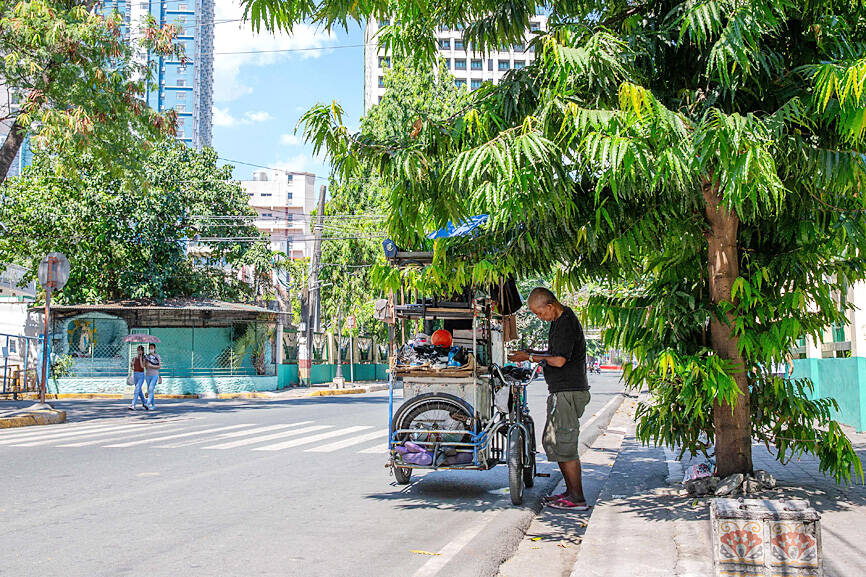The Philippines would suspend in-person classes in all public schools for two days due to extreme heat and a nationwide strike by jeepney drivers, the Philippine Department of Education said yesterday.
Extreme heat has scorched Southeast Asia in the past few weeks, prompting thousands of schools to suspend in-person operations and authorities to issue health warnings. Many schools in the Philippines have no air-conditioning, leaving students to swelter in crowded, poorly ventilated classrooms.
“In view of the latest heat index forecast ... and the announcement of a nationwide transport strike, all public schools nationwide shall implement asynchronous classes/distance learning on April 29 and 30, 2024,” the department wrote on Facebook.

Photo: AFP
The department oversees more than 47,000 schools across the archipelago nation.
Some jeepney drivers also plan to hold a three-day nationwide strike starting today to protest the government’s plan to phase out the smoke-belching vehicles used by many to commute to work and school.
The suspension of in-person classes comes after the temperature in Manila on Saturday hit a record high of 38.8°C, with the heat index reaching 45°C, Philippine Atmospheric, Geophysical and Astronomical Services Administration (PAGASA) data showed.
The heat index measures what a temperature feels like, taking into account humidity.
The hot weather persisted yesterday, with many people flocking to air-conditioned shopping malls and swimming pools for relief.
“This is the hottest I’ve ever experienced here,” said Nancy Bautista, 65, whose resort in Cavite province near Manila was fully booked due to the hot weather.
“Many of our guests are friends and families. They swim in the pool to fight the heat,” Bautista said.
The months of March, April and May are typically the hottest and driest of the year, but this year’s conditions have been exacerbated by the El Nino weather phenomenon.
“All places in the country, not necessarily just Metro Manila, are expected to have hotter temperatures until the second week of May,” PAGASA weather forecaster Glaiza Escullar said. “There is a possibility that the areas will exceed those temperatures being measured today until the second week of May.”
Camiling municipality in Tarlac province, north of Manila, recorded a temperature of 40.3°C on Saturday — the country’s highest this year.
As the mercury rose, Gerise Reyes, 31, said she planned to take her two-year-old daughter to a shopping mall near Manila.
“It’s hot here at home. This is the hottest I’ve ever experienced especially between 10am and 4pm,” she said. “We need a free aircon to cut our electricity bill.”

CHIP WAR: The new restrictions are expected to cut off China’s access to Taiwan’s technologies, materials and equipment essential to building AI semiconductors Taiwan has blacklisted Huawei Technologies Co (華為) and Semiconductor Manufacturing International Corp (SMIC, 中芯), dealing another major blow to the two companies spearheading China’s efforts to develop cutting-edge artificial intelligence (AI) chip technologies. The Ministry of Economic Affairs’ International Trade Administration has included Huawei, SMIC and several of their subsidiaries in an update of its so-called strategic high-tech commodities entity list, the latest version on its Web site showed on Saturday. It did not publicly announce the change. Other entities on the list include organizations such as the Taliban and al-Qaeda, as well as companies in China, Iran and elsewhere. Local companies need

CRITICISM: It is generally accepted that the Straits Forum is a CCP ‘united front’ platform, and anyone attending should maintain Taiwan’s dignity, the council said The Mainland Affairs Council (MAC) yesterday said it deeply regrets that former president Ma Ying-jeou (馬英九) echoed the Chinese Communist Party’s (CCP) “one China” principle and “united front” tactics by telling the Straits Forum that Taiwanese yearn for both sides of the Taiwan Strait to move toward “peace” and “integration.” The 17th annual Straits Forum yesterday opened in Xiamen, China, and while the Chinese Nationalist Party’s (KMT) local government heads were absent for the first time in 17 years, Ma attended the forum as “former KMT chairperson” and met with Chinese People’s Political Consultative Conference Chairman Wang Huning (王滬寧). Wang

CROSS-STRAIT: The MAC said it barred the Chinese officials from attending an event, because they failed to provide guarantees that Taiwan would be treated with respect The Mainland Affairs Council (MAC) on Friday night defended its decision to bar Chinese officials and tourism representatives from attending a tourism event in Taipei next month, citing the unsafe conditions for Taiwanese in China. The Taipei International Summer Travel Expo, organized by the Taiwan Tourism Exchange Association, is to run from July 18 to 21. China’s Taiwan Affairs Office spokeswoman Zhu Fenglian (朱鳳蓮) on Friday said that representatives from China’s travel industry were excluded from the expo. The Democratic Progressive Party government is obstructing cross-strait tourism exchange in a vain attempt to ignore the mainstream support for peaceful development

ELITE UNIT: President William Lai yesterday praised the National Police Agency’s Special Operations Group after watching it go through assault training and hostage rescue drills The US Navy regularly conducts global war games to develop deterrence strategies against a potential Chinese invasion of Taiwan, aimed at making the nation “a very difficult target to take,” US Acting Chief of Naval Operations James Kilby said on Wednesday. Testifying before the US House of Representatives Armed Services Committee, Kilby said the navy has studied the issue extensively, including routine simulations at the Naval War College. The navy is focused on five key areas: long-range strike capabilities; countering China’s command, control, communications, computers, cyber, intelligence, surveillance, reconnaissance and targeting; terminal ship defense; contested logistics; and nontraditional maritime denial tactics, Kilby